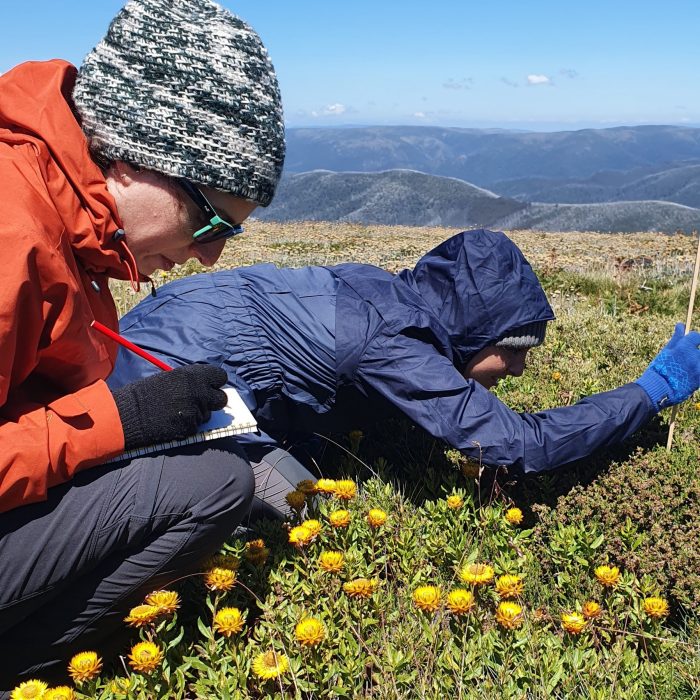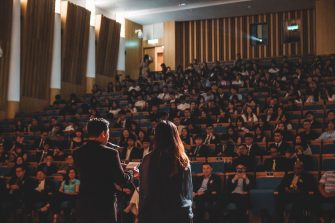Study with us

The graduate program of the Evolution & Ecology Research Centre (E&ERC) at UNSW aims to foster excellence in postgraduate research and supervision, and the development of skills to better equip research students for careers in science.
Students are offered support for their own research projects and a wide-ranging program of activities aimed at developing a broader conceptual understanding of the discipline and enhanced research skills. Excellence in postgraduate research is recognised by annual prizes for theses, publications, presentations and other research activities.
Expectations for our postgraduate students
The postgraduate program has been developed to facilitate interactions between all members of the E&ERC. Broad participation of E&ERC students and staff enhances the experience of postgraduate students through increasing collaboration (and socialising) and promoting the transfer of skills between centre members. Postgraduate students are expected to participate in the E&ERC functions, and attend research seminars and the postgraduate research forum.
As a general rule, all postgraduate students should be attending the majority of E&ERC seminars, both regular seminars in the E&ERC series (Fridays, every other week) and special seminars given by visiting scientists. Students should also anticipate participating in at least one E&ERC workshop during their tenure and attend at least one E&ERC event each year that does not include specialty workshops. Active participation in postgraduate events is an important aspect of life as a postgraduate student and is also considered during deliberations for E&ERC’s annual prizes and other awards.
Postgraduate Research Forum
Twice each year, the research activities of students are featured in the E&ERC Postgraduate Forum. Presentations from students across the centre, and associated social events, promote the effective communication of science and allow students to receive valuable feedback from fellow students and academics. The next forum will be held in August 2020 (usually the week after the last teaching week of each session). All students are expected to attend, organising their research (i.e. fieldwork commitments) well in advance of these dates.
E&ERC research seminars
The centre features regular research seminars on alternate Friday afternoons by resident and visiting academics and research fellows. Attendance at these seminars is considered essential for exposure to wide variety of evolutionary and ecological research topics, critical thinking beyond a student’s individual project and gaining potential contacts.
Visiting speakers are frequently high profile researchers top in their area of expertise.
Seminar scheduling is coordinated by A/Prof. Lee Rollins. Students should check the E&ERC seminar series section for dates and times of upcoming seminars.
-
The E&ERC hosts extended visits from distinguished international and regional research scientists. The visitors will give research presentations, participate in workshops and discussions, meet individually with research students, and attend dinners or other social events.
In 2019, the PG Student Committee invited Professor Bob Wong from Monash University and A/Prof. Cate Macinnis-Ng from the University of Auckland. As part of their visit, the PG Student Committee organised a student workshop each and speaker gave a seminar.
Previous distinguished visitors have included:
- Dr Michael E. Price, Brunel University, UK (2018)
- Prof. Madeleine van Oppen, Australian Institute of Marine Science, Aus (2018)
- Dr Jonathan Pruitt, UC, Santa Barbara (2016)
- Prof. Troy Day, Queen’s University, Canada (2016)
- Prof. Mike Wimberley, Geospatial Sciences Center of Excellence at South Dakota State Univ (2016)
- A/Prof. Liran Carmel, Hebrew University in Jerusalem (2016)
- Prof. Martin Thiel, Universidad Catolica del Norte (2015)
- Dr Sasha Dall, University of Exeter (2015)
- Prof. Maciej Boni, Oxford University Clinical Research Unit, Ho Chi Minh City (2015)
- Prof. Jeffrey H. Schwartz, University of Pittsburgh (2014)
- Prof. Martin Daly, University of Missouri (2014)
- Dr Donald Baird, University of New Brunswick (2014)
-
The E&ERC hosts short conferences on areas of research strength. In these conferences, academics and postgrads from the E&ERC, and other Australian and global researchers present seminars and participate in discussion groups on current and future research directions in that research area.
Previous conferences hosted by the E&ERC have included:
- 2016: Prof. David Warton presented "Model-Based Multivariate Analysis of Abundance Data using R" course 22-26 November 2016.
- 2015: E&ERC together with the Eco-Stats research group at the UNSW School of Mathematics and Statistics hosted the Eco-Stats '15: Technological advances between Ecology and Statistics conference at UNSW in December 2015
- 2014: "Phenotypic Variation and Evolution" Symposium organised by Dr Lisa Schwanz. This was held on 15 & 16 September. Speakers included: Prof. Mark Blows (UQ), Dr Carla Sgro (Monash), Dr Matt Hall (Monash), A/Prof. Glenda Wardle (Usyd), Prof. Ben Oldroyd (Usyd), Dr Adrienne Nicotra (ANU), A/Prof. Simon Griffith (Mq)
- 2014: "Meta-analysis and Data compilation" workshop, held 2-4 April 2014 and organised by Dr Habacuc Flores-Moreno. Presenters included A/Prof. Shinichi Nakagawa and Dr Will Cornwell.
- 2014: "Cooperation and conflict in the family" organised by Centre Director, Prof. Rob Brooks and Jason Collins (UWA). This conference was held 2-5 February 2014; it brought together leading economic and evolutionary researchers to explore the nature of conflict and cooperation between the sexes in the areas of marriage, mating and fertility.
- 2013: "Colour Analysis" workshop, was held 14 & 15 November 2013 and organised by Dr Michael Kasumovic. This workshop covered the different techniques currently available for analysing colour data. A hyperspectral camera was available to see how well it works under different laboratory and field scenarios for different types of animals, plants and non-living organisms.
- 2013: "Women in science" a career building workshop for women in academia was held on 18 September as part of the Distinguished Visitor Program that was hosted by A/Prof. Tracey Rogers.
- 2013: "Mammals response to change", this conference was part of the Distinguished Visitor Program that was hosted by A/Prof. Tracey Rogers. It was held on 20 September and brought together researchers and academics from Australia and USA.
- 2013: "New opportunities at the Interface between Ecology and Statistics", a two day Eco-stats symposium was organised by A/Prof. David Warton 11 & 12 July 2013.
- 2012: "Shifting species interactions and the tropicalisation of temperate marine ecosystems", which brought together ecologists and oceanographers from Australia, USA, Japan and Spain to discuss and review the ecological impacts of climate-mediated changes in species interactions.
-
A committee of postgraduate students from various labs within the Centre function as a steering team that ensures postgraduate students have a direct say in current and future activities of the Centre. For example, the committee proposes, and often subsequently develops, new initiatives where gaps are evident in the graduate program. The committee also hosts student-invited external speakers (e.g., for the distinguished visitors program; see above) and arranges social events focused on integrating new postgrads and creating a sense of belonging in the centre. Events include a wine and cheese evening, trivia night and a movie night. Student tenure on the committee circles on an annual basis and is open to nominations from any E&ERC postgraduate student. Most current members are 2nd year PhD students, but this is by no means an explicit requirement. Calls for new nominations go out on a 6-month basis.
The 2020 PG Committee are: Shannen Smith (shannen.smith@unsw.edu.au) and Baptiste Wijas (b.wijas@student.unsw.edu.au)
-
There is more to developing a research career than simply finishing a postgraduate degree. With experienced mentors, we aim to provide resources and advice for students at various steps along the pathway to a research career. The most tangible way the centre achieves this is through special interest courses in which faculty and senior postgraduates provide advice on various aspects of a successful research career, including funding opportunities, grant writing, research networking, and finding employment. These courses are recurrent and will generally overlap a student’s tenure within the graduate program. Nevertheless, new students should feel free to contact Dr Daniel Falster (daniel.falster@unsw.edu.au) to express interest in any past courses that have not been run recently, or to propose ideas for any new, future courses that might be run by the centre.
Please contact Dr Daniel Falster (daniel.falster@unsw.edu.au) for a copy of the E&ERC Graduate Program Handbook



